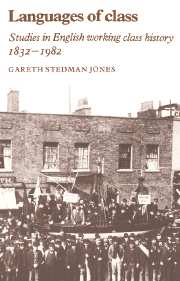Book contents
- Frontmatter
- Contents
- Acknowledgements
- Introduction
- 1 Class struggle and the Industrial Revolution
- 2 Class expression versus social control? A critique of recent trends in the social history of ‘leisure’
- 3 Rethinking Chartism
- 4 Working-class culture and working-class politics in London, 1870–1900: Notes on the remaking of a working class
- 5 Why is the Labour Party in a mess?
- Index
- Frontmatter
- Contents
- Acknowledgements
- Introduction
- 1 Class struggle and the Industrial Revolution
- 2 Class expression versus social control? A critique of recent trends in the social history of ‘leisure’
- 3 Rethinking Chartism
- 4 Working-class culture and working-class politics in London, 1870–1900: Notes on the remaking of a working class
- 5 Why is the Labour Party in a mess?
- Index
Summary
Each of the studies collected together in this book concerns the relationship between society and politics in England in the nineteenth and twentieth centuries: in particular, the changing place attributed to the ‘working classes’ or ‘working class’ within the development of the polity. If this topic merits new historical attention, it is certainly not because it has previously been ignored, but rather because the ways in which it has been considered important and the reasons given for its importance have generally been taken for granted. There are of course countless studies and histories of the working class. But most of them proceed all too smoothly along tramlines welded together long ago from a rough but apparently serviceable mixture of utilitarian, evolutionist and Marxist assumptions. In the new historical epoch which we appear to have entered, in which a whole set of conventional beliefs about working-class politics have been put into doubt – both nationally and internationally – a critical scrutiny of some of the intellectual premisses upon which these beliefs have been based can only be a gain. In England, what Eric Hobsbawm has recently described as ‘the halting’ of ‘the forward march of labour’ suggests the need not simply to examine ‘the halting’, but also to question the metaphor itself. It is in this spirit that these essays have been collected together. It may not be possible for a historian to ask what sort of substantive reality ‘the working class’ as such might have possessed outside the particular historical idioms in which it has been ascribed meaning.
- Type
- Chapter
- Information
- Languages of ClassStudies in English Working Class History 1832–1982, pp. 1 - 24Publisher: Cambridge University PressPrint publication year: 1984



